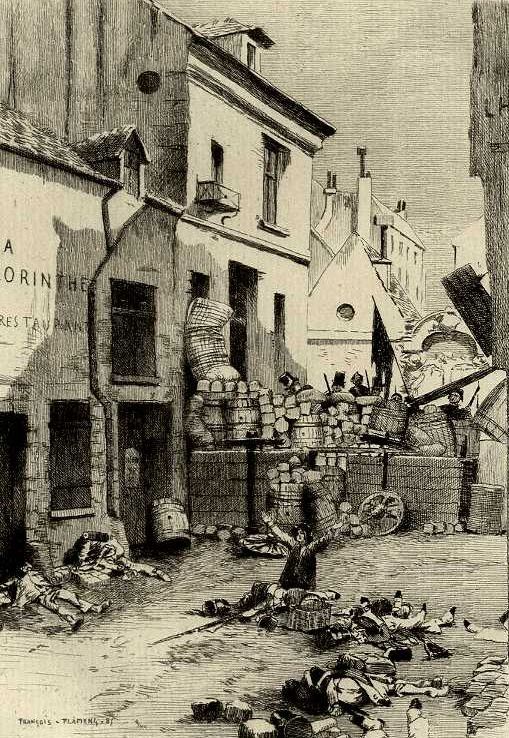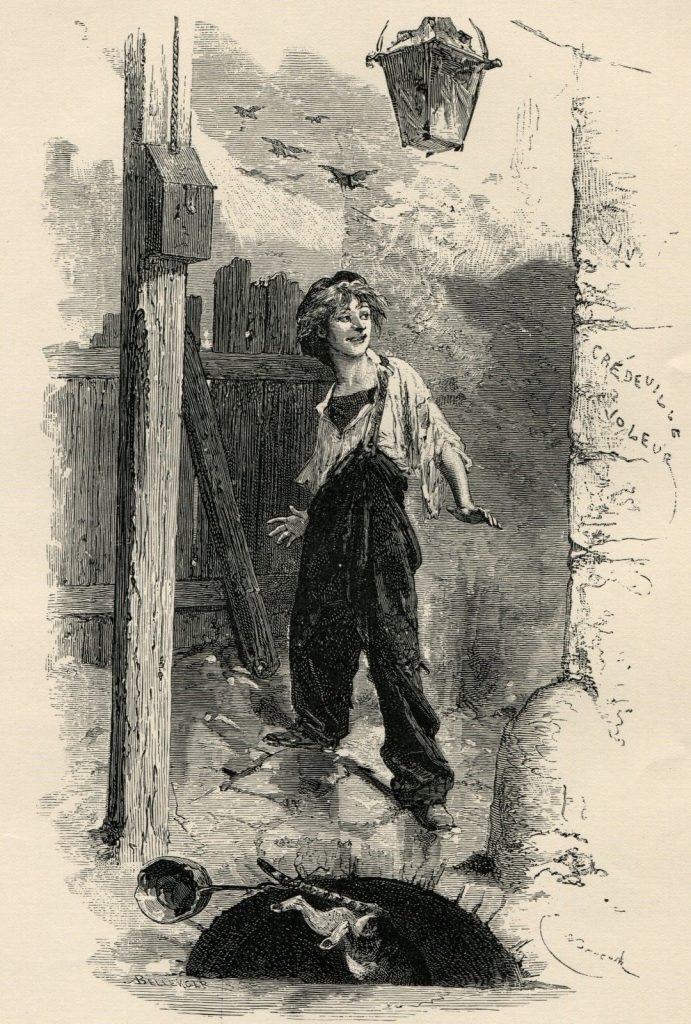Les Misérables, the American Civil War, and Violent Revolution

Throughout most of recorded history, political power has been wielded and maintained, at least in part, by force and threat of violence. Absolute rule by monarchs, chieftains, and religious leaders has been the norm, with scattered instances of republican government and democratic practices emerging from time to time in Ancient Greece and Rome, early modern Britain, and Renaissance Florence. It was not until the late eighteenth century that Enlightenment philosophy from western thinkers like Jean-Jacques Rousseau and Voltaire helped renew concepts like social contracts and civic virtue. When combined with the notions of popular sovereignty and classical liberalism, movements for independence from colonial powers and absolute rulers gained traction. Violent revolutions among people in the British colonies in North America and in France created new republics, despite the martial resources of the establishment.
A critical component of the new republican ideology that helped inspire these popular revolutions was the idea that a governing entity is only legitimate when it enjoys the express consent of the people. But the monarchs of Europe, who believed they ruled by divine right, did not acknowledge the will of the people as superior to God’s ordained plan and did not cede power willingly. Thus, republics typically did not appear without armed struggle and were usually crushed in embryo or short-lived. The forces of reaction proved stronger than rebels, who were often divided and disorganized. By 1861, the young American republic was one of the few surviving examples of a successful transition from monarchial rule, but it was under attack from within.
One principle that American founders enshrined in their Declaration of Independence was the right of revolution. Thomas Jefferson wrote, “whenever any form of government becomes destructive of [the Declaration’s ends, it is the right of the people to abolish it, and to institute a new government.”[i] The French Revolution’s constitution similarly declared that “when a government violates the rights of the people, insurrection is for the people, and for every portion thereof, the most sacred of rights and the most indispensable of duties.” Rebelling Southerners were quick to invoke this rationale as an inherent right to justify their secession from the United States of America in 1861 and create a slaveholding republic. A similar principle may be construed from Lincoln’s Gettysburg Address of 1863. Lincoln invoked the Declaration of Independence when he proclaimed “a new birth of freedom”[ii] as part of a second great American revolution that would end slavery and create a more just republic.
Hugo was an ardent abolitionist who championed John Brown and shared Brown’s conviction that righteous insurrection was a moral imperative which justified the use of violent means to achieve human progress. Hugo placed Brown on par with Washington, Garibaldi, Kosciusko, Bolivar, and other famous revolutionaries.[iii] His novel was unabashedly political. Key characters in Les Misérables undergo conversions of conscience that convince them to embrace violent revolution as a pious duty. Bishop Myriel, a fervently religious man like Brown, transforms from a pacifist into an advocate of violent insurrection when it serves a morally progressive purpose. He then inspires Jean Valjean to change from a petty criminal into a principled revolutionary.[iv] Marius Pontmercy matures from young royalist to republican insurrectionist, willing to risk his life for a righteous cause.[v]

Hugo’s epic tale regaled American Civil War soldiers with a romantic tale of a wronged people suffering and dying for sacred political principles. Confederate diarist James Park Caldwell, writing from the Union prison camp at Johnson’s Island in Ohio, nicknamed his roommate “Gavrocche” after the young boy in Hugo’s novel who showed remarkable courage for his age. He equated his plight with another Hugo character by claiming the sobriquet “Cosette” for himself, since both he and the fictional heroine were forced to carry water in the dark. [vi] Another Confederate soldier remembered that his less worldly comrades who could not understand the French language referred to Hugo’s masterpiece as “Lee’s Miserables.” Soon, weary rebel soldiers began referring to themselves by that name.[vii]
Most Confederate soldiers were reading editions of Les Misérables published in the South that conveniently excised passages lionizing John Brown or promoting abolition and purposely mistranslated the French word esclavage for “slavery” as “degeneracy.”[viii] Thus, rebel soldiers could imagine themselves taking the moral high ground as real-life heroes, fighting for independence against the cruel despot Lincoln.
Union soldiers, on the other hand, had ample access to more complete and reliable translations of Hugo’s radical tome, including digressions which castigated slaveholding states as immoral and inconsistent with true republican norms. While the timing of its publication coincided with the uptick in war casualties at Shiloh and Lincoln’s preliminary Emancipation Proclamation and Les Misérables may have had the potential to transform Union soldiers into revolutionaries, there is no evidence that it did. Like their enemies on the battlefield, Federal soldiers focused on the romantic storyline and identified with the tribulations of its often-tragic characters as a way of dealing with the daily horrors of war.
Both sides, however, had a psychological need to claim that that they were fighting for a just cause, and that even the extreme violence of a civil war was sometimes necessary to achieve a righteous political end. In this context, Les Misérables came along at an opportune time. The United States in 1861 may not have been France in 1832, but Hugo’s theories of violence as a revolutionary imperative were widely accepted in both armies.
Sources:
[i] Thomas Jefferson, Declaration of Independence (Jackson, MS: Applewood Books, 1997).
[ii] Abraham Lincoln, The Gettysburg Address and Other Speeches (New York: Penguin Books, 1995).
[iii] Victor Hugo, Les Misérables (New York: Carleton Publishing, 1862), 588.
[iv] Emily S. Turner, ““Books Like This Cannot Be Useless”: The Political and Popular Reception of Victor
Hugo’s Les Misérables in Civil War America”. Senior Theses, Trinity College, Hartford, CT 2018.
Trinity College Digital Repository, https://digitalrepository.trincoll.edu/theses/711, 12—13.
[v] Turner, ““Books Like This Cannot Be Useless,” 17—22.
[vi] James Parks Caldwell, A Northern Confederate at Johnson’s Island Prison: the Civil War
Diaries of James Parks Caldwell, George H. Jones, ed. (Jefferson, N.C.: McFarland, 2010), 76.
[vii] John Esten Cooke, Mohun: or, The Last Days of Lee and His Paladins (New York: F.J.
Huntington and Co, 1869), 325.
[viii] Turner, ““Books Like This Cannot Be Useless,” 52.